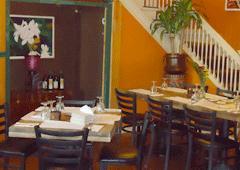I was in a room full of people flapping my arms like a chicken. Now, I’m usually outgoing, but this was a crazy bit of antics even for me. However, it probably would have been much stranger if the other 30 people in the room hadn’t been flapping their arms right along with me.
I was eating lunch at the Dalchinni restaurant, the location of Karma Kitchen, when one of the volunteers asked all of us to stand up. He then proceeded to turn up the music and teach us some traditional folk dancing from Punjab, India. We shrugged our shoulders, tapped our feet, waved our hands and yes, even flapped our arms. We danced and laughed and enjoyed being together. Normally, not everyone in a restaurant would be willing and excited to dance with the other diners, but Karma Kitchen is not a normal restaurant.
Karma Kitchen is a program led by CharityFocus. A nonprofit organization founded by Nipun Mehta and his wife Guri, CharityFocus coordinates and develops volunteer opportunities. Karma Kitchen is a volunteer-run social and economic experiment. Originally located in Berkley, California, Karma Kitchen now has locations in D.C. and Chicago, and there is talk of expanding the program to a location in New York as well.
Karma Kitchen is a dining experience featuring a preset vegetarian and vegan menu. Instead of ordering what you want, you tell the volunteers what you don’t want and everything else on the menu is served family-style. At the volunteer meeting before D.C.’s chapter opens for the day, Sujata Bhat, a coordinator, describes this change in mindset. She tells the other volunteers that the diners “are not guests. They’re not customers. They’re your friends who came to your home for dinner.”
Yet this remarkable shift in thinking isn’t the only thing that sets Karma Kitchen apart from other restaurants. Karma Kitchen is based on the idea of a gift economy, that is, your meal was paid for by someone who dined before you. This means that your bill is $0.00.
However, in order to keep the cycle going, every guest is encouraged to make a contribution after eating a meal. Some give more and some give less, but hopefully it all balances out at the end of the day. As Angela, a D.C. Karma Kitchen volunteer, put it, “The idea is that there is no expectation. This is a gift, and it is your choice.”
Krishna Desar was working at the Dalchinni restaurant when his friend Gitanjali Chakabarty, a graduate of Georgetown, explained the idea of Karma Kitchen to him. Chakabarty’s husband Somik Raha was a friend of Nipun Mehta, the founder. Chakabarty thought Dalchinni would be an ideal place to host Karma Kitchen and Desar agreed. In February 2009, D.C.’s Karma Kitchen was up and running.
Almost two years later, eating at Karma Kitchen is still a completely unique experience. The Dalchinni restaurant functions as most restaurants function, except on Sundays from 12 p.m. to 3 p.m. when Karma Kitchen takes over.
If you enter Dalchinni during these hours, exotic aromas, lively music and a friendly smile from a volunteer host will greet you. If you’re lucky, you might get a seat at the community table, a large table where strangers sit together to share a meal. Hopefully by the end of the meal, you will no longer be strangers.
“It’s very different from a regular restaurant…People are always skeptical [when they first hear about it],” volunteer Loveena Dookhony said.
And skeptical I was. I was going to sit at a table with people I had never even met to share a meal with them? This was sure to be awkward.
Oddly enough, it wasn’t. While sharing many savory Indian dishes such as tofu and peas, black daal (lentil) and rice and curried potato and carrots, I got to know the people around me. I was surprised by how many different people had gathered there and how open people were with one another. My neighbor even showed me some pictures of his young son.
This willingness to share yourself with others is the purpose of Karma Kitchen. Jina, a visitor to D.C.’s Karma Kitchen who has also dined and volunteered at the Karma Kitchen in Berkley explained, “the whole concept is experiencing generosity.” People volunteer to help run Karma Kitchen and your meal was paid for by someone before you. Karma Kitchen gives you the opportunity to continue this chain of generosity by contributing money at the end of your meal or maybe even by volunteering on a future Sunday.
At the end of our meal, Aditi our volunteer server came over and handed me a pale blue envelope. In the envelope was a comment card and a slip of paper that read “Your Bill Total: $0.00. Continue the circle of giving in your own way. To pay-it-forward for a future guest you can make an anonymous contribution in this envelope.”
You could either put cash in the envelope or ask one of the volunteers to charge a certain amount to your credit card. Amazed at their faith in society, I slipped the envelope into the small wooden contribution box by the door.
As I was leaving the cheerful chatter and the brightly painted walls of the restaurant, Aditi handed me a beautiful set of stationary from India. She told me that Karma Kitchen sometimes gives gifts to diners and that it was for me because I was a writer.
As Krishna Desar, the coordinator who helped start the D.C. Karma Kitchen said, “Karma Kitchen is about food from the heart and food for the stomach.”








